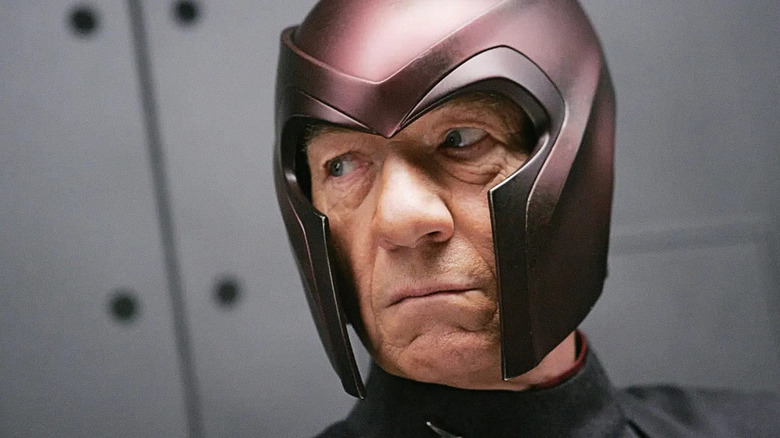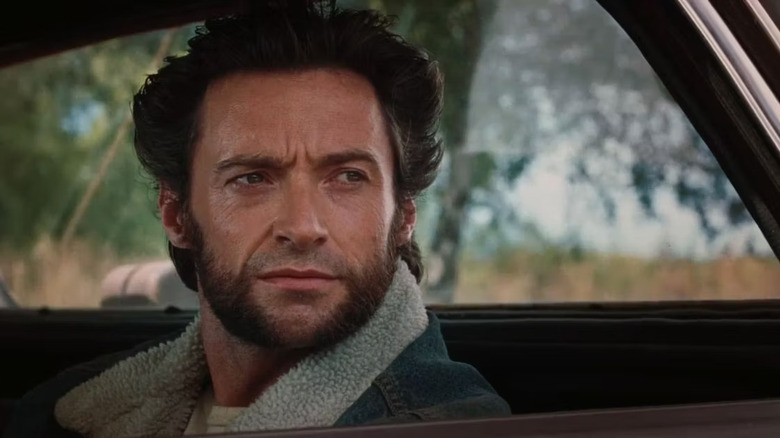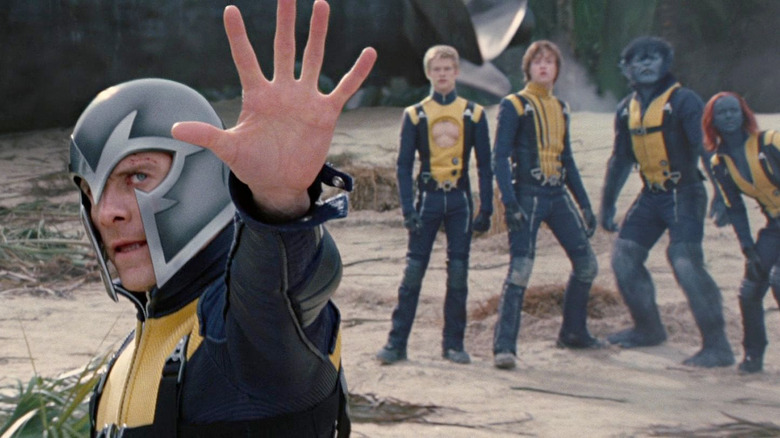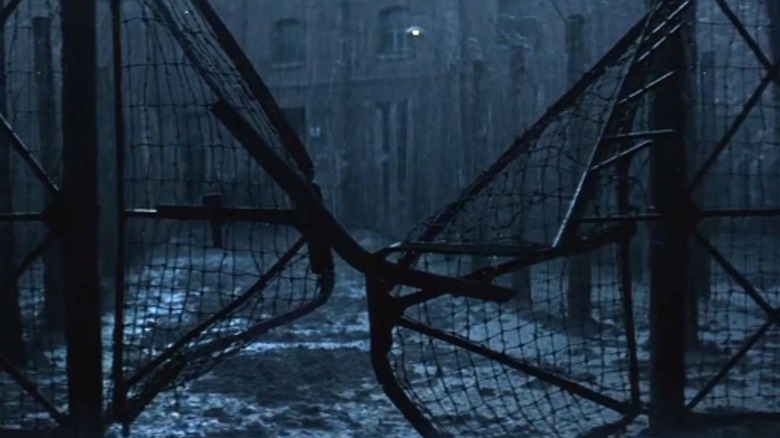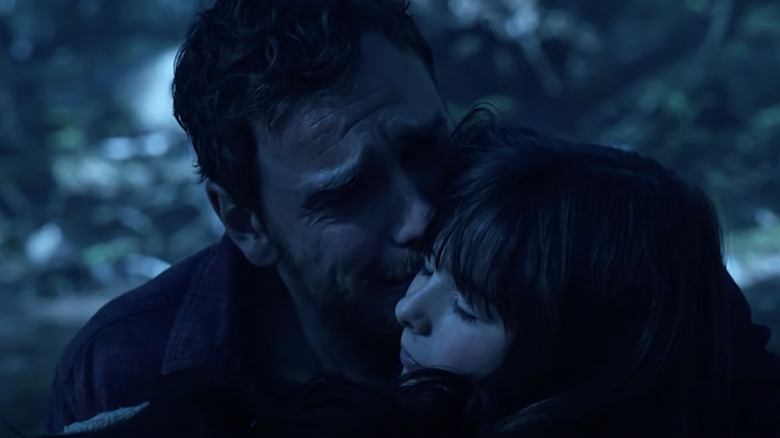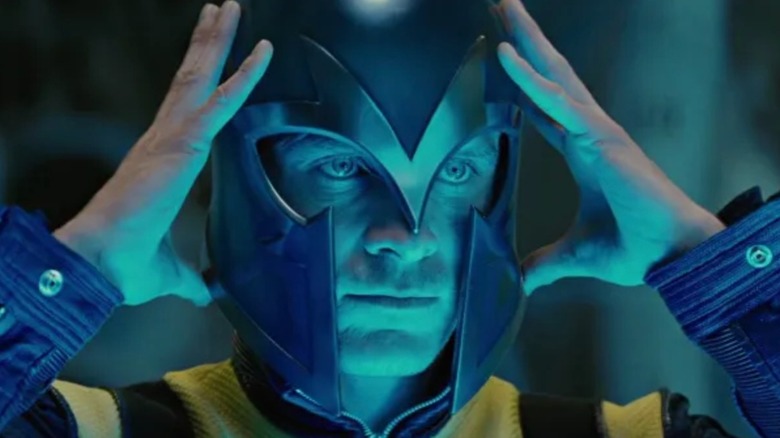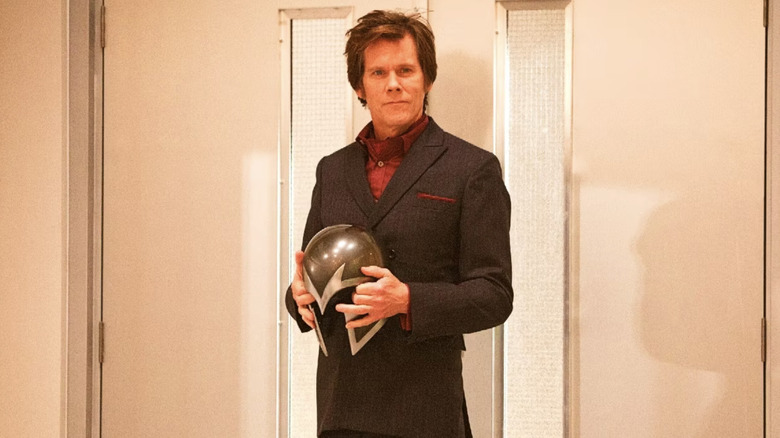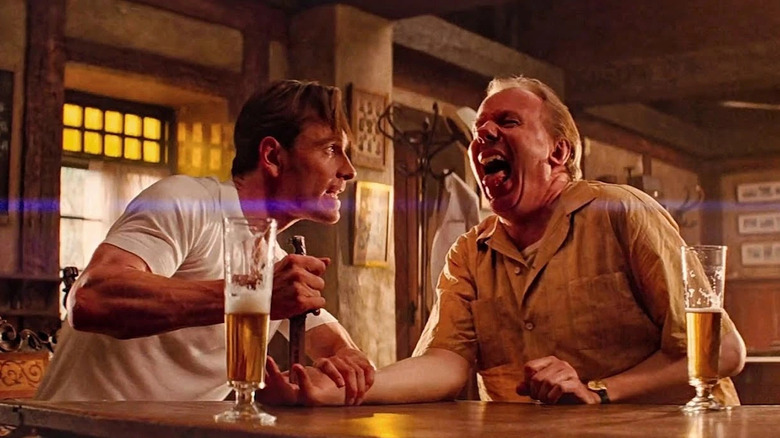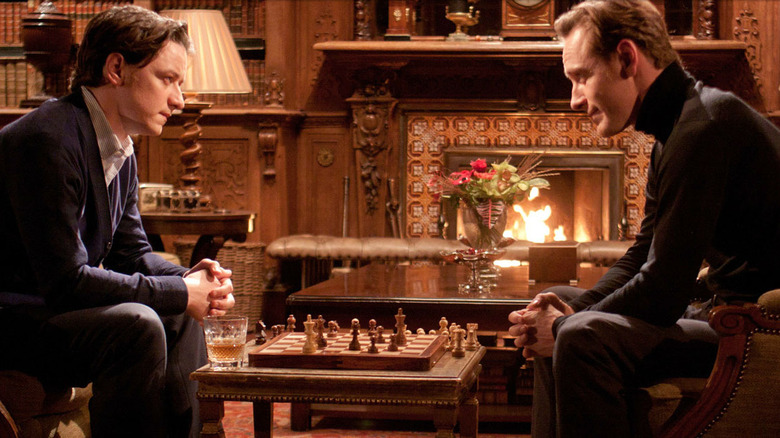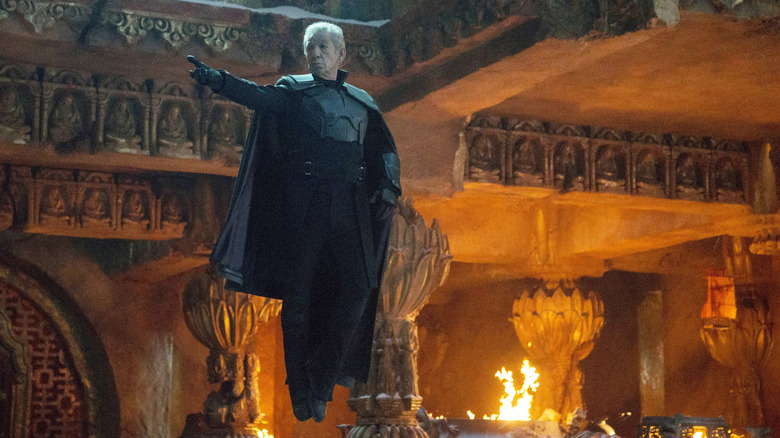Why X-Men Origins: Magneto Was Canceled
It can seem like "superhero movie" is an automatic greenlight in Hollywood these days. Yet, the genre is still littered with unrealized projects.
One is "X-Men Origins: Magneto." True to its title, it would've chronicled the early years of the X-Men's arch-foe. If any Marvel villain could sustain an origin movie, it's Magneto, who has one of the boldest backstories in superhero comics. In the 1980s, "X-Men" comic writer Chris Claremont desired to revitalize Magneto, to make him "a more credible adversary, but also a more credible person." That meant offering a reason for why he believed in mutant supremacy. Claremont considered what was known about Magneto and struck upon brilliance:
"Magneto had to have come to adolescence, and possibly come of age, in the Second World War. And he certainly looked European. And what would have given him such an extreme attitude toward mutant-human relations? [...] The next corollary was, 'Oh. The Holocaust.'"
Magneto (born Erik Lehnsherr or Max Eisenhardt, depending on the version — we'll call him Erik since that's what the movies use) was born to a Jewish family in 1920s Germany. His family was sentenced to Auschwitz after the Nazis took power, with Erik the only survivor. Having seen the worst horrors that human prejudice has to offer, Magneto is forever convinced that mutants and humans can't cohabitate without violence. This means that his best friend, mutant integrationist Charles Xavier/Professor X, is also his greatest adversary.
The "X-Men" movies, to their credit, embraced this backstory. The first one opens in Auschwitz; as Erik's parents are herded to their deaths, he reaches out and, using his powers for the first time, crushes a metal gate separating them.
With such a compelling hook, how did "X-Men Origins: Magneto" never make it to the screen?
The shadow of Wolverine
In 2003, "X2" proved that the first "X-Men" film wasn't a one-off success. So in late 2004, prequel spin-offs centered around Wolverine and Magneto were announced separately. "Magneto" was to be written by Sheldon Turner ("The Texas Chainsaw Massacre: The Beginning"), whose pitch was "'The Pianist' meets 'X-Men.'"
This shows that even before "X-Men: The Last Stand" was released in 2006, 20th Century Fox already had plans to take the X-brand past the end of the trilogy. As it turned out, that film was a dud that killed way too many important characters. Pushing the series in a new direction, and going to the past, probably seemed like a smart pivot. So, in 2007, the Wolverine film was confirmed to have the full title "X-Men Origins: Wolverine," a clear signal of a rebrand with an intention to make more "X-Men Origins" films.
Then, "Wolverine" was released in the summer of 2009. It was panned by critics and fans with an underwhelming box office take ($373 million on a $150 million budget, lower than both "X2" and "The Last Stand"). Too many cooks in the kitchen and a troubled production created a mess (read director Gavin Hood's account here). Far from a more intimate character study, one that embraced the horror of Barry Windsor-Smith's "Weapon X" comic, "Wolverine" spent far too much time focused on other mutants. If you want the beginning of superhero films caring more about teeing up spin-offs than telling their own stories, look no further.
Producer Lauren Shuler Donner had previously said the fate of "Magneto" would depend upon "Wolverine." Sure enough, "Magneto" was confirmed canceled in December 2009. The "X-Men Origins" series was DOA, with that branding never to be used in a movie title again. However, the plans for "Magneto" weren't abandoned, per se.
Upstaged by First Class
Fox had another "X-Men" prequel on the docket — "First Class." This film would focus on, you guessed it, the inaugural class of mutant students at Xavier's School for Gifted Youngsters. In other words, the founding X-Men. The original "X-Men" director, the now disgraced Bryan Singer, was brought on board to plot a treatment "First Class," throwing out the original script by Josh Schwartz.
Rather than giving characters like Cyclops or Storm a moment in the spotlight, Singer chose to concentrate on the early days of Xavier and Magneto's friendship. This rendered "Origins: Magneto" redundant. Singer told the Hollywood Reporter in 2009:
"['First Class'] would probably utilize some of the Magneto story because it deals with a young Magneto, so it might supersede ['X-Men Origins: Magneto'] because this would explore that relationship between a young energetic professor and a disenfranchised victim of the Holocaust."
Even so, the influence of "X-Men Origins: Magneto" remained; Sheldon Turner has a story credit on "First Class." It's fair to say the final version of "X-Men: First Class," directed by Matthew Vaughn, is a combination of that film's original conception and "Origins: Magneto." How does it compare to Turner's plans?
Turner's script part 1
An undated draft of Turner's "X-Men Origins: Magneto" script has circulated online. The script spans 114 pages, indicating a runtime of just under two hours. The writing is rather precise for a screenplay, with camera and editing suggestions, indicating it's a late draft if not a shooting script.
The script employs a present-day framing device. Magneto (presumably to be played by Ian McKellen as in the original trilogy) attends a celebration for the 60th anniversary of Auschwitz's liberation.
We then flashback 60 years to 1944, picking up where the cold open of the first "X-Men" film left off; Erik has been knocked unconscious by Nazi guards after twisting the barb-wired gate. He awakens in a laboratory, where the sadistic Dr. Kleinmein tortures him to find the root of his powers. Kleinmein is running genetic experiments, trying to, for instance, artificially induce blond hair and blue eyes in subjects.
The Auschwitz segment takes up five pages, including events like Erik stopping an execution by telekinetically jamming a guard's guns and meeting a Roma prisoner named Magda. When the Red Army liberates the camp, Erik and Magda leave together.
The script jumps ahead 10 years. Erik and Magda are living together in Ukraine with their daughter, Anya. The Lehnsherrs are relatively poor but still happy. Erik (described as a handsome and muscular man with a "mane" of black hair) works in construction but has few friends; he still wears his Star of David necklace even though antisemitism is alive and well.
Turner's script part 2
Only Anya knows of Erik's powers — at first. One night, he recognizes a former Nazi in a bar and when he approaches the man, he's attacked. The brawl ends when Erik lifts a knife in the air and stabs his attacker in the back. This is the first time he's killed a man, and murdering someone, even a Nazi, upsets Erik's stomach.
The alarmed village folk gather into a lynch mob and burn the Lehnsherrs' home, killing Magda and Anya. A grieving Erik tears the village apart with his powers (though the last part is only revealed around page 75 in a flashback). The death of Magneto's daughter Anya was first referenced in "Uncanny X-Men" issue #150, the same issue that revealed his Holocaust survivor backstory. The event was later depicted in "Classic X-Men" #12 (written by Claremont, art by John Bolton).
11 months later, in 1956, Erik is in Paris to meet a famed Nazi hunter, Professor Noah Wesenthein. The professor tries to dissuade Erik from his quest, giving him the business card for a trauma therapist in Israel who helps Holocaust survivors heal. Instead, Erik distracts Wesenthein and steals his files.
Erik travels to Argentina, where he finds a former Nazi living under an assumed name as a wealthy banker. Erik initially tries to report him to the authorities, first by showing his photo and fingerprints to the local police and then dragging him to the American embassy, but to no avail. He's approached by CIA agent Owen Graves, who proposes they form an alliance — Erik agrees in exchange for information on Kleinmein.
After more Nazi hunting, Erik's actions attract the attention of Congressman Robert Kelly (played by Bruce Davison in the first "X-Men" film), who shuts down the operation. Spurned by Graves packing up and his excuse of "just following orders," Erik departs for Israel.
Turner's script part 3
In Israel, Erik visits his only remaining family: his hospitalized, dementia-ridden grandmother Rachel. She doesn't recognize him and it seems he really is all alone. Then he finally goes to the therapist Wesenthein recommended: Charles Xavier. He's running an institute to help troubled people, both with his telepathy and normal therapy.
The two become friends, even if they're split from the beginning due to Erik's militancy and Charles' pacifism. When Erik fends off an attacking Egyptian tank with his powers, Charles realizes his new friend is a fellow mutant. Erik, who assumed his powers were the result of Nazi science, realizes he's not alone at all.
More of the Nazis track down Erik and destroy Charles' institute, but Erik learns that Kleinmein is in Washington DC. The twist — the doctor was Operation Paperclip'd into American service. The CIA wants his findings on mutants to create super soldiers. Graves knew this and was stringing Erik along.
Erik departs for America. After confronting Graves, he's captured by the CIA but then rescued by Charles; Erik is surprised to see him but Xavier says he couldn't let his friend face this challenge alone. Together, the two free Kleinmein's mutant children test subjects while Erik finally kills Kleinmein, telling Charles it was an accidental death (Charles wants "so badly to believe [that]").
The two friends purchase land in Westchester, New York to build their school/haven for Mutants. When Erik goes back to his temporary apartment though, he puts on a metal helmet, the "crown" of Magneto, designed to block Charles' telepathy. The "seed of distrust" that tears them apart is already planted.
The movie ends in the present day; Charles finds Erik at the Auschwitz memorial while now-Senator Kelly gives a speech condemning mutants. Erik departs, again tearing apart a metal gate with his powers.
Fade to black.
A First Class comparison
The thrust of Magneto's story in "First Class" is the same as Turner's script; he's hunting down a Nazi scientist he has a personal vendetta against. However, in "First Class" it is "Klaus Schmidt"/Sebastian Shaw (Kevin Bacon), a mutant himself. Shaw, who has the all-mutant Hellfire Club as his minions instead of human Nazis, wants to destroy the world and then conquer the remains for mutant-kind, rather than controlling mutants as weapons. Erik kills Shaw but then takes up his mutant supremacist ideology (and nicks his helmet), becoming what he hated.
Shaw's death in "First Class" is an improvement on Kleinmein's in the "Magneto" script. In the former, Erik saves a coin that Shaw once asked him to move with his powers (when he failed, Shaw shot his mother in front of him). Charles telepathically immobilizes Shaw then, over his objections, Erik pushes the coin through Shaw's head, cross-cut with Charles screaming in agony. In the script, Erik simply crashes a car into Kleinmein's own and then leaves him to bleed out — much less visceral.
I, Magneto
Erik's characterization is also different in the script, mostly owing to the early scenes of him as a family man. "First Class" didn't include that (it was recycled for "X-Men: Apocalypse" instead), and the implication becomes that Erik has been a Nazi-hunting nomad his entire adult life. Take the scenes in "First Class" where Erik tortures a banker for information by pulling on his metal tooth fillings, or where he toys with then murders three Nazis in an Argentinian bar — this is a man accustomed to violence, which is not the Erik in Turner's script.
Rather than a Jewish James Bond, he's a normal man forced into taking action, one who only gives into murder after peaceful justice fails him. Since Turner's script is solely Erik's story, not an ensemble like "First Class," giving him more of a transformative character arc makes sense.
In "First Class," Erik is compared to Frankenstein's Monster; a product of unethical science now hunting his creator for revenge. The "X-Men Origins: Magneto" script uses a different literary allusion: the Book of Job. In that Biblical tale, Job was a prosperous and faithful man. Satan made a bet with God that Job would turn on him if he lost everything. God took the bet and Job suffered.
That leads us to the next point; Erik's Jewishness is emphasized more in Turner's script than in "First Class." Take how he continues wearing his Star of David, despite the horrors and enduring antisemitism he's suffered. After his family's murder, Erik consults a Rabbi about how the Kaddish (a Jewish prayer) isn't helping his grief. Erik is also shown reading a Bible, which he eventually tosses aside, signaling his faith in God is finally over.
A bond stronger than love
Then there's the matter of tone. "X-Men Origins: Magneto" is somber and stripped down with little fanservice; compare this to all the extraneous mutant cameos in "X-Men Origins: Wolverine." "First Class," though, is an action-adventure film with more comedy, an emphasis on highlighting mutant powers, and a golden sheen to its palette. It's also the first "X-Men" movie where the heroes have their yellow-and-blue comic suits.
The main overlap is Erik and Charles' relationship, even if the circumstances of their meeting are different. Both the script and finished film have a scene where Erik lets Charles read his mind so that his friend may see his memories and understand his pain. Many of their conversations/debates about ideology also ring familiar. I didn't find Turner's versions as gripping as the scenes in "First Class," but that might just be a compliment to James McAvoy and Michael Fassbender and how their chemistry makes those conversations sing.
"X-Men Origins: Magneto" ends at an earlier point; Charles and Erik are still partners, whereas in "First Class" their splintering happens after they've known each other only weeks and the film ends with Erik declaring himself Magneto. I think Turner's ending is a smart choice. Prequels are often tempted to show everything, but taking a leaner approach is better. This is Erik's story, not Charles' or the X-Men's. The script leaving details open but acknowledging the inevitable with Erik assuming the helmet is a good "less is more" closing note.
"First Class" also uses the helmet as a symbol of Erik's distrust of Charles; Magneto puts it on before he kills the frozen Shaw to block out Charles' influence. By wearing the helmet, Magneto literally and metaphorically shuts out his friend.
The verdict
So, could "X-Men Origins: Magneto" have been a good movie? Based on this script, I don't think it and "First Class" were as incompatible as Singer claimed. I think it would've been quite easy to make a version of "First Class" as a sequel to "Magneto." This hypothetical film could place the focus more on the young X-Men themselves with Charles and Erik's divide boiling in the background.
Turner's script, at least the available draft, might have been too restrained for a blockbuster. It seems the executives and producers at 20th Century Fox must have thought so since they bet on the more colorful "First Class" to save the franchise instead. On the other hand, a lower budget feature might not have been the worst idea when "X-Men" was in a precarious position; the franchise later found success with this approach in the R-rated "Logan." "X-Men" comics fans who hated the movies for being so non-comic-book-y wouldn't have been won over though.
There is an elephant in the room: David S. Goyer, who had been attached to rewrite and direct "X-Men Origins: Magneto." Goyer is a superhero movie veteran (he co-wrote "The Dark Knight" trilogy), but not an accomplished director; he has only "Blade: Trinity" and some panned horror movies on his resume. He's also a writer who needs a collaborator to excel, so putting him behind the wheel probably would've doomed "X-Men Origins: Magneto." Would Goyer, for instance, have chosen Michael Fassbender for Erik or James McAvoy for Charles like Matthew Vaughn did? Doubtful, and who knows if the selected actors would've been as dynamite as that pair proved to be.
A Magneto origin movie is not a bad idea — Turner's script makes a pretty good go at it too. However, the stars just weren't aligned to make this script into the movie it could've been.
